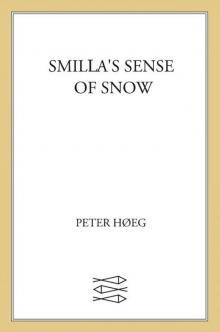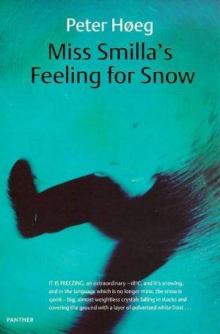- Home
- Peter Høeg
Borderliners Page 8
Borderliners Read online
Page 8
* * *
I do not know how long we sat there. It came to the point where she slowly curled up and went to sleep. I carried her to bed. I sat down and looked at her. I thought about what she had said, and why.
She had said it to conquer her sorrow at the woman’s absence.
But she had said it to me.
* * *
I waited in the grounds for several hours. It was very cold, even though I had the blanket. Flakkedam came before it was light, he let himself out of the entrance and left it open, then he started on his tour of the rose bed. When he had gone I slipped inside. August was fast asleep. The window had been left open. The smell of gas was gone.
FIFTEEN
Katarina let three days go by after my visit. I knew she had not forgotten us or given up. I did not see her when she came. Suddenly she was just there, behind me, in the playground.
“Don’t look around,” she said.
I checked out the teacher on duty anyway.
“They’re forgetting us,” she said.
I had had the same thought. That was the way of the rule. They had so many to keep an eye on. As long as you kept a low profile, in time you would be forgotten. It was the best thing that could happen.
“You two have third period free,” she said. “We can meet at the clinic.”
The clinic was Hessen’s clinic. Which was out of bounds and impossible to get at.
“It’s Wednesday,” she said. “The door on the ground floor will be open, they’ll be bringing in the milk.”
* * *
During free periods you could do homework or read a book of your choice, but you could not leave the classroom. I let fall a remark about having to go to the toilet, just in case the channel to the office was open. And August had to come with me, since I had been ordered never to leave him behind in the classroom.
Outside, I did not say where we were going, he would have refused. I just twisted his arm up his back and frog-marched him along. He put up no resistance.
The door to the south staircase was open. We ascended to the fifth floor without meeting a soul.
The clinic was not locked, it could not be locked. I had talked about this to Hessen—we talked openly about things like that, as part of my personal insight into my illness. When the clinic was set up she had expressly requested that the lock be removed, so that people would not feel cooped up. She had said that this should be the one place in the school where you felt most free and welcome.
I opened the door and went in. Katarina was sitting on a chair over by the window.
There was a big mirror on the wall, between the door to the next room and the loudspeaker panel. Hessen had told me that she had been an instructor in Mensendieck gymnastics. Now and again we had rounded off my visits to her by my having to take off my shirt and my undershirt. Then we would stand side by side facing the mirror and I had to move my arms and shoulders and head in different ways. She had explained that this could, in the long run, correct my bad posture. Now the mirror seemed like a hole, or like some thing, watching you. It had curtains. I drew them.
I took off my shoes and socks, removed the panel over the loudspeaker, and laid the socks over the membrane. It was not 100 percent safe, but it would muffle the sound.
It would not have done to sit at the table where one had so often sat with Hessen. I took the chair over to the window and set August on it. I remained standing.
He sat there, looking out the window. It did not seem possible that she would ever get through to him. I had had three weeks, but no more than a few minutes of contact. The rest of the time he had been cooped up inside himself. Besides which, it was the first time they had met.
“There is a plan behind the school,” she said, “so many things happen, you’re never given any explanation. We are going to study it scientifically, like in a laboratory.”
She did not look straight at him. She must have sensed that he could not bear that. Nor did she look at me, who, in fact, was not all that keen on it either. She looked at a point between us, she had spoken pretty softly. She unfolded two pieces of paper.
“This is the teachers’ timetable,” she said, “and Hessen’s. I copied them down.”
She spoke to August without looking straight at him.
“I was late five times. For that you get sent to Biehl. I came early on purpose and waited in the secretary’s office. The timetable is stuck up on the wall. When the secretary went out I copied it down—as much as I could manage. The rest I worked out by asking around the other classes. Once I had it I could draw up a plan of when the rooms were in use. These two timetables, together with the pupils’ one that I had already made up—they give the complete schedule for the entire school. That’s all I wanted to say. You can go now if you don’t want to be in on this.”
At first he was quiet. Then he pulled up his shirt. He had some papers tucked in against his stomach, he unfolded them. It was the two drawings—the one that was rewarded and the first one, where the background had not been filled in. He did not throw his drawings away like other people.
“You draw something,” he said, “and you get nothing. Then you do the same thing again, but this time you get a star and are praised, how come?”
He said it casually, without looking at her. He was testing her. If she got it wrong she would have lost him.
She looked at the drawings. It was as though she were listening to them, in the same way that she had listened to me—then I knew that she would reach him.
“It’s something to do with time,” she said. “You got a star because you had spent more time on the second drawing. And spent the time in a particular way. We think they have a plan, and that it has to do with time.”
“So the second one wasn’t any better?”
Now he was looking straight into her face, she was careful not to meet his gaze.
“There’s no such thing as ‘better,’” she said. “The second one just fitted in better with their plan.”
* * *
How could she know that? She was only sixteen, how could she know that and say it?
* * *
When is one thing better than another? It is a crucial question.
Although, usually, what one has in mind is that something is not good enough. Oscar Humlum, for example, was just not good enough. Axel Fredhøj did not think he was either. Nor I. It said in the record: “of average intelligence,” but right from the start they had acknowledged that that was probably stretching things a bit.
That, even so, it is I who am left, and able to ask questions, here, in the laboratory, and not Humlum, for example, is not because I was better—I have never said that. I just wanted so badly to live.
* * *
At Crusty House, in a 400-meter race, it was always possible to determine who could run better than everyone else. And pretty often in soccer, you could say that one pass was better than another. But it was actually less common than you might imagine. And mainly in straightforward situations offering very few openings.
In Biehl’s classes it was obvious when an answer was correct.
With Karin Ærø things were a little less precise but, on the whole, there was never any serious doubt as to who sang true enough to be in the choir.
One has to be left with the impression that this thing about assessing the merit of a person’s singing or answers or soccer was something straightforward, something strictly regulated.
But in all of these instances an answer did already exist. That you had to score, or remember a particular date or sing true or run a distance under a certain time. There was a clearly defined quadrangle of knowledge—like a chessboard, like a soccer field. So it was pretty easy to see what was correct and what was wrong, and when one thing was better or worse than another. But if it became just a little bit more complicated, like at the start of an attack, or in midfield, then you could no longer be sure what the answer would be. Like with August’s drawing. You would think, in that case, that
it would have to be almost impossible—after all, it was his. How could an answer already exist as to how it should be?
* * *
When you assess something, you are forced to assume that a linear scale of values can be applied to it. Otherwise no assessment is possible. Every person who says of something that it is good or bad or a bit better than yesterday is declaring that a points system exists; that you can, in a reasonably clear and obvious fashion, set some sort of a number against an achievement.
But never at any time has a code of practice been laid down for the awarding of points. No offense intended to anyone. Never at any time in the history of the world has anyone—for anything ever so slightly more complicated than the straightforward play of a ball or a 400-meter race—been able to come up with a code of practice that could be learned and followed by several different people, in such a way that they would all arrive at the same mark. Never at any time have they been able to agree on a method for determining when one drawing, one meal, one sentence, one insult, the picking of one lock, one blow, one patriotic song, one Danish essay, one playground, one frog, or one interview is good or bad or better or worse than another.
Never at any time. Nothing that comes anywhere near a code of practice.
But a code of practice is essential. To ensure that things can be spoken of, fully and frankly. A code of practice is something that could be passed on, maybe not to a character like Jes Jessen, or me, but at any rate to someone like Katarina or a teacher.
But, in all the history of the world, no code of practice has ever existed for the assessment of complex phenomena.
And certainly not for what crops up in the laboratory.
* * *
And yet everyone talks in terms of what is good or bad. And now and again they can be pretty much in agreement. For example, everyone was pretty much in agreement that with Oscar Humlum—the bit I have not been able to talk about yet—it was no great loss. Nor, in fact, with Axel Fredhøj, and definitely not Jes Jessen. Apart maybe from me and a handful of others—we were not in agreement. The thing about Humlum, that did not go down very well with me—and not just because he had saved me, that had happened long before. Since then, not a day has gone by that I have not thought of him. It is more than twenty years ago now. Often he is there, between your dreaming and your waking; often he comes to the laboratory and talks to me. For a long time after it happened it was enough to drive you insane. Sometimes, the way you felt, you wished you could go insane.
But that is not how it works, you cannot just go crazy. And then, when you have been selected to be average, or a bit below, you have to do something else in order to keep going. You have to develop a strategy.
I suppose that is why I have turned upon the part about the assessments.
* * *
If no code of practice exists for determining when something is good or bad, why do people talk as though it does? How could they be so sure when they awarded stars and points and wrote notes in the record and decided who was gifted in mathematics or art and referred Humlum to the Central Mission Home for the Retarded on Gersons Road, and committed me, for an indefinite period, to Himmelbjerg House because the fact that I was of average intelligence amounted to exacerbating circumstances? If there is no code of practice, why is everyone so very, very sure?
* * *
Katarina came close to an explanation.
That first time, at the clinic, she only mentioned the bit about the stars and time. But that was enough. For me, in a way, that has continued to be enough—for all of my life up to this point.
How could she know that they had never been able to prove that one thing is better than another?
* * *
She had probably not worked it out logically. Actually, I would have to say I believe that I gave more thought to it than she did. The greater the fear, the more thinking you do. Yet she came closer to the truth than anyone else.
Maybe that is how it works—that whatever is closest to the truth you do not think about; you cannot reach it by achievement; you can only feel it. And feeling is something you can do, even when you are only sixteen.
* * *
While she was talking about his drawings he had stood up.
“I knew there was a conspiracy,” he said.
I set him back on the chair.
“We have to get back soon,” I said. “We’ve gone to the toilet.”
He did not hear me.
“What about you, girl,” he said. “Where do you fit into this?”
I knew what he meant. That she was, after all, one of the well-to-do kids—she could not have problems. So what was in this for her? That was what he meant.
But she understood. That she had to give him something in return, if she wanted him to join us.
“You have this idea that it must be terrible when people hang themselves,” she said, “that they fall a long way. But it doesn’t have to be like that.”
She spoke as though we knew what all this was about, and as though August knew the bit about her mother, too. She said that, with her father, on the surface things had been quiet and calm. After her mother’s death it was as though he began to dread the daylight, if you could imagine such a thing. Often he did not get up, and when he did, he would just sit there waiting for the day to pass. Often he would sit and stare at a clock. As if trying to make the seconds pass more quickly. In the end he had gone off to their farmhouse in Sweden—where they used to go every summer—and there he hung himself, in the living room.
“From a door handle,” she said. “You don’t have to do it from high up. He put a rope around his neck and then he sat down and put a bit of weight on the rope so that it tightened and stopped his circulation. Then he lost consciousness and all his weight pulled down on it, and he was dead.
“Once it’s happened,” she said, “you’re left with it, so you have to do something.”
“So why this thing about a laboratory?” asked August.
She started to sing. Just one verse. At first you thought she was going crazy. The words were familiar, we had sung them often at assembly, but this time they sounded different.
“… To the Christ Child’s crib my heart is ever brought,
There I can gather the sum of all my thoughts.”
She was in the choir, but even so it was incredible that she sang alone.
“That was where I got the idea,” she said. “You have to have a place where you can gather your thoughts. Like people who pray. That is what is difficult here at the school. Peter says it is like glass tunnels. There is no chance to think for yourself. A laboratory is a place that is shut off, so you have peace and can think and carry out your experiment.”
She had risen and started walking back and forth.
“It is already under way. It is the middle of a period, we are not where the plan says we should be, we have stepped out of the glass tunnel. The experiment is already under way. Something is happening to us, can you feel it? What is it? What’s happening is that you are starting to become restless, you want to get back, you can feel time passing. That feeling is your chance, you can feel your way and learn something you would otherwise never have seen. Like when I came late on purpose. I stepped out of the tunnel I was used to walking along, I saw Biehl, and I noticed something.”
August was sitting bolt upright. He did not say a word, but his body was listening.
“He’s scared, too,” she said.
“Why me?” said August.
She was standing over by the other door, beside the mirror. There was a lock on it, no one knew where it led. She answered in all honesty.
“We have to find out why they took you. There is no understanding it.”
There was no harm intended. She just said exactly what she thought.
A sound came over the loudspeaker. I made a sign to the others, then I removed the socks. The sound was very faint, you could not tell anything from it except that the channel had been opened.
&nbs
p; I put on the socks. Katarina put back the chairs, quite soundlessly. Then I went out onto the stairs and looked down.
They were on their way up from the third floor. I stepped back inside and closed the door. It was Fredhøj and Flakkedam, you could identify them by Fredhøj’s jacket sleeve and Flakkedam’s shirt. It could have been worse, Biehl himself could have been with them. He only came for serious accidents, like with Axel Fredhøj, or for on-the-spot expulsions.
Even so, I thought this was the end, at any rate for August and me. We had already gone way over the limit.
There was a knock at the door. They could just have opened it, but at Biehl’s one always knocked first. High up in the doors to the lower grades there were small panes of glass. Before the loudspeaker system was installed Biehl used to do his rounds of the new teachers, peeking in through the glass to see whether they could control the pupils. If there was any trouble, he came in. But even then he knocked first.
Katarina was about to say something, she did not get the chance. They opened the door.
* * *
Normally they separated people for a certain length of time—one or two months, for example—but in our case there were special, exacerbating circumstances.
We were questioned individually, and then we were isolated from one another, for an indefinite period. Each of us was assigned to our own part of the playground. They moved August out of my room and back to the sickroom. We still sat together in class, though, because there was no opportunity for conversation during periods.
It was Fredhøj who examined us. He told me that he had been requested to present me with my final warning.
PART TWO
ONE
Time?
Soon I must say. But not yet. It is still too early.
* * *
Biehl’s podium was wooden, with Greek columns. On it were carved the words “I and my house will serve the Lord,” and, farther down, “Under the shadow of thy wings.”
So, protection and darkness. As a hen gathers her chicks under her wings. As if to protect them from birds of prey.

 The Woman and the Ape
The Woman and the Ape Smilla's Sense of Snow
Smilla's Sense of Snow Borderliners
Borderliners The Susan Effect
The Susan Effect The History of Danish Dreams
The History of Danish Dreams The Elephant Keepers' Children
The Elephant Keepers' Children The Quiet Girl - Peter Hoeg
The Quiet Girl - Peter Hoeg Smilla's Sense of Snow aka Miss Smilla's Feeling for Snow
Smilla's Sense of Snow aka Miss Smilla's Feeling for Snow